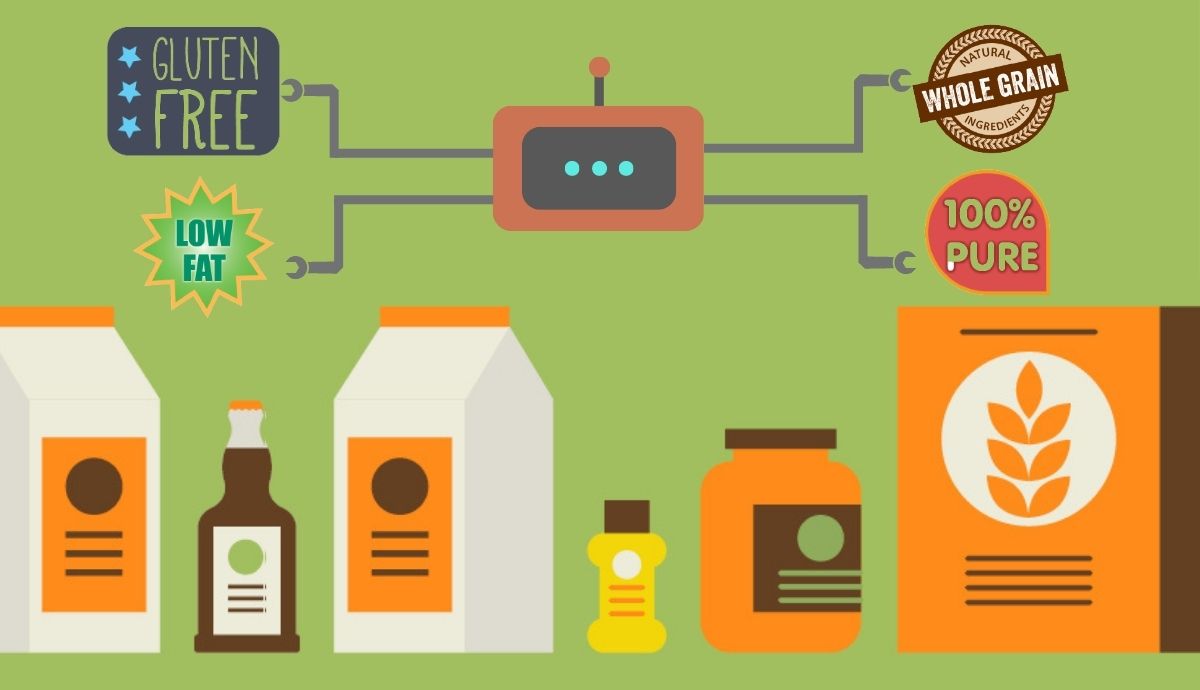Artificial Intelligence (AI) in Advertising Claims on Food Labels
June 5, 2023

Keywords: AI for food label claims, Advertising Claims on Food Labels, Machine learning, Food claim labelling, Natural language processing
Food Labelling is a zero-error requirement, and needs 100% accuracy. In the itricate world of food labelling claims, accuracy is non-negotiable. Consumers crave transparency and demand products that align with their dietary needs and preferences. Misleading or erroneous claims not only erode trust but also pose serious health risks.
That's where artificial intelligence (AI) comes in!
Leveraging advanced technologies like natural language processing and machine learning, AI can meticulously scrutinize every claim on your product labels, ensuring they are compliant and truthful. By harnessing the power of AI, manual work and human error can be minimised, while precision and credibility come to the fore of the food labelling process.
Let’s discover the transformative potential of AI in food labelling claims and discover how it can empower food businesses to make advertising claims that are both, correct and regulatory compliant.
What are Advertising and Labelling Claims on Food Labels ?
Advertising and Labelling Claims on Food Products are the backbone of product transparency and information disclosure in the food industry. It refers to the practice of conveying specific claims or statements about a food product's characteristics, nutritional content, health benefits, and production methods on its packaging or labelling. The purpose of food claim labelling is two-fold: to inform consumers accurately and to promote fair competition among food manufacturers.
When it comes to food claim labelling, there is a wide array of claims that can be made on food labels. These claims serve different purposes, catering to the diverse needs and preferences of consumers.
Some of the common types of claims you can find on food labels:
Nutritional Claims: These claims focus on the nutritional composition of the product, such as "low fat," "high in fiber," or "good source of vitamin C." They provide valuable information to consumers who are conscious of their dietary intake.
Health Claims: Health claims highlight the potential health benefits of consuming a particular food. For example, "may reduce the risk of heart disease" or "supports immune health." These claims help consumers make informed choices based on their health goals.
Allergen Claims: These claims alert consumers to the presence or absence of specific allergenic ingredients, such as "gluten-free," "dairy-free," or "contains nuts." They are crucial for individuals with dietary restrictions or allergies.
Environmental Claims: With growing environmental awareness, food labels now often include claims related to sustainability, eco-friendliness, and ethical sourcing practices, such as "organic," "fair-trade," or "locally sourced."
By understanding the different types of claims that can be made on food labels, food manufacturers can better communicate the qualities and benefits of their products to consumers.
Also Read: What Kind Of Health Claims Are Allowed On Food Labels? | FoLSol InfoCenter
Challenges with Current Advertising and Labelling Claims on Food Labels
The current landscape of advertising claims on food labels comes with its challenges. With innumerable product launches, it is a it becomes a monumental task for regulatory bodies to thoroughly scrutinize each claim. This lack of adequate scrutiny can be responsible for misleading or inaccurate claims to slip through the cracks, leaving consumers potentially at risk.
Inaccurate food labelling can have far-reaching consequences that extend beyond mere disappointment. When consumers are presented with false or misleading claims, their trust in both the product and the brand takes a significant blow. Imagine a scenario where a supposedly "gluten-free" product actually contains traces of gluten, triggering adverse reactions in individuals with gluten sensitivities or celiac disease. Such instances not only compromise consumer health but also shatter their confidence in the accuracy and integrity of food labelling. Moreover, inaccurate food claims can create a ripple effect within the industry, tarnishing the reputation of honest manufacturers and sowing seeds of doubt among consumers.
Recognizing these challenges is crucial in understanding the urgency for a transformative solution. This is where AI steps onto the stage, offering a glimmer of hope and a pathway to rectify the flaws of traditional food claim labelling practices. By leveraging AI technologies, we can address the current challenges head-on and pave the way for a future where accurate, transparent, and trustworthy food labelling is the norm. So, let's delve deeper into how AI can revolutionize food claim labelling and unlock a new era of precision and consumer trust.
How AI can improve Advertising and Labelling Claims on Food Labels ?
1. Precision:
One of the key advantages of AI lies in its ability to identify inaccurate claims with exceptional precision. By analyzing vast amounts of data, AI algorithms can detect inconsistencies or misleading information, ensuring that your product claims are always accurate and precise. Natural language processing algorithms can comb through product descriptions and ingredient lists, ensuring that claims align with the composition of the product. This not only helps maintain regulatory compliance but also safeguards your brand's reputation and consumer trust.
2. Reducing Human Error:
AI is a powerful tool for reducing errors in advertising and labelling claims on food labels. Traditional manual processes are prone to human error, leading to mistakes that can have far-reaching consequences. AI, on the other hand, operates with unmatched accuracy, minimizing the risk of errors and ensuring that your product labels communicate the correct information. From nutritional claims to allergen statements, AI-powered systems can meticulously cross-reference data and provide reliable, error-free labelling.
3. Streamline Processes and Reduce Effort:
AI streamlines the entire process of advertising and labelling claims on food labels, making it more efficient and cost-effective. With the help of natural language processing, AI algorithms can quickly analyze and understand the meaning behind complex regulatory language, allowing for swift and accurate assessment of claims. Machine learning algorithms can continuously learn and adapt from data, improving their accuracy and efficiency over time. This means that as you use AI in food claim labelling, the system becomes more efficient, saving you time and resources in the long run.
Machine learning algorithms can be trained on large datasets of approved claims and regulatory guidelines, enabling them to make accurate predictions and suggestions for compliance. These applications of AI not only enhance the accuracy and reliability of food claim labelling but also provide food manufacturers with valuable insights and actionable information.
High-quality training data is crucial for AI models to make accurate predictions and avoid biases. Collaboration with diverse data sources and industry experts ensures comprehensive and representative data, reducing biases and improving accuracy.
As we look to the future, the role of AI in advertising and labelling claims on food labels is set to expand and evolve. With advancements in technology and increased adoption, AI will continue to drive accuracy, efficiency, and consumer trust in food labelling practices.
Innovations like FoLSol-AI®, India's 1st AI-led Digital Food Labelling Models, are paving the way for a new era of precise and transparent labelling. By combining AI algorithms with user-friendly interfaces, FoLSol-AI® holds the potential to revolutionize the industry, empowering food manufacturers to meet regulatory requirements effortlessly while building trust with their customers.
About LabelBlind®
Established in 2018 and based in Mumbai, LabelBlind® specialises in the area of Digitising Food Labelling and Regulatory Compliance. FoLSol® by LabelBlind® presents India’s 1st Digital Food Labelling Solution. The SaaS platform supports Food Businesses to be Labelling Compliant and Build Consumer Trust. FoLSol® by LabelBlind® is designed to strengthen the food labelling ecosystem across a wide spectrum of services including, Packed Food Labelling, Menu Labelling, Exports Labelling, Nutraceuticals and Food Supplements Labelling and Labelling for Ecommerce players. FoLSol® Digital Food Labelling Solution is fast, accurate, and cost effective. The company is ISO9001 certified in its processes.
References
Food Safety and Standards (Advertising and Claims) Regulation, 2018 | FSSAI | https://www.fssai.gov.in/upload/uploadfiles/files/Compendium_Advertising_Claims_Regulations_14_12_2022.pdf
The AI-Powered Future of Food Labelling: How Technology is Driving Change | FoLSol Infocenter | https://www.foodlabelsolutions.com/info-centre/Digital-Food-Labels/the-ai-powered-future-of-food-labelling-how-technology-is-driving-changes/

Layeba Siddique (MSc Nutraceutical)
Layeba has a passion for exploring innovative applications of technology in the space of food science. Additionally, she has a profound fascination for space exploration.
